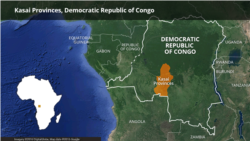A team of U.N. experts reports a decrease in violence in the Democratic Republic of Congo’s Kasai region and they say a change in governing authorities may present an opening for peace and reconciliation in the troubled region. The team has presented a report Wednesday on the current situation in Kasai to the U.N. Human Rights Council.
The chairman of the team of experts, Senegalese lawyer Bacre Ndiaye, says Kasai remains riven with violence and gross violations of human rights. But he says newly elected Congolese authorities are committed to punishing serious crimes. And this, he says, gives hope that conditions are in place to begin the fight against impunity and to consider community reconciliation.
However, he says the relative calm that has settled over the region in recent months is precarious as humanitarian crises continue to erupt.
“We have seen from demobilization and clashes in February 2019 between the regular army and the Kamuina Nsapu militia a number of problems. The context, however, is propitious for peace and for all the players concerned to play their role,” he says.
Ndiaye says reconciliation will be possible only if victims of crimes receive justice. He urges the authorities to strengthen the fight against impunity. He says investigations into violence committed in Kasai between 2016 and 2017 have not resulted in a single verdict. He calls for an acceleration of investigations into all serious crimes.
“The investigation strategy and the prosecution strategy adopted by military justice should better reflect the massive number of sexual and gender-based violence, as well as the situation of child soldiers," he said. "Decapitation crimes, the destruction of buildings, burning of homes and persecution should also be covered.”
Ndiaye warns the window of opportunity for peace risks closing if Kasai, a poor, landlocked region does not receive support in improving its economic and social development.
DRC’s Minister of Human Rights, Marie-Ange Mushobekwa agrees major steps toward reconciliation and a lasting settlement of the conflict in Kasai are taking place.
She urges the U.N. Council to extend the mandate of Bacre Ndiaye’s team for another 12 months. She says that extension is needed to support the Congolese government in implementing its recommendations.





